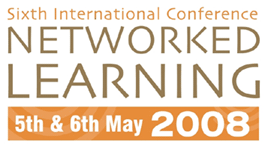

Decisions on Networked Learning based on Fuzzy Cognitive Maps
Athanasios Tsadiras and Demosthenes Stamatis
Department of Information Technology, Technological Educational Institute
of Thessaloniki, Greece, tsadiras@it.teithe.gr, demos@it.teithe.gr
Abstract
In this paper we present Fuzzy Cognitive Maps, a well established decision
making technique based on Fuzzy Logic, for making decisions concerning
Networked Learning. After long discussions and extended interviews with
a Networked Learning expert, a Fuzzy Cognitive Map was created that models
the key factors of Networked Learning and the various causal relationships
that exist among them. The list of the concepts that were identified as
playing important role in Network Learning and should appear in the FCM,
are the following:
Concept 1. Simplicity of Learning Environment
Concept 2. Collaboration (between students, between teachers, between
students and teachers)
Concept 3. Administrative/Technical Support
Concept 4. Course Domain (relevance to computers, suitable for techno
lovers or technophobic groups)
Concept 5. Institutional Policy on Networked Learning
Concept 6. Size of Target Group
Concept 7. Size of Class
Concept 8. Quality of Networked Learning
Concept 9. Number of Tutors per Class
Concept 10. Student Satisfaction
The FCM was first examined statically. It was found that it contains a total of 252 cycles from which 123 are positive cycles and 129 are negative cycles. The existence of such a high number of cycles implies strong and long interactions between the concepts of the FCM. The density of model’s graph was calculated and found extremely high, indicating the complexity of the case. The conceptual centralities of the concepts that exist in the model were also calculated and the most central, and consequently the most important concepts of the model were found to be concept C3: “Administrative/Technical Support”, followed by concept C2: “Collaboration”.
After that, dynamic studies of the FCM model are made and a number of
computer simulations are performed to examine the predicted consequences
of specific scenarios/decisions on Networked Learning. The scenarios imposed
to FCM are the following:
Scenario Description
| Scenario | Description |
|---|---|
| #1 | All concepts are free to interact |
| #2 | Activation of C7: “Size of Class” is set & kept to 0.5 (moderate increase). All other concepts are free to interact. |
| #3 | Activation of C6: "Size of Target Group" is set & kept to 0.25 (low increase). All other concepts are free to interact. |
| #4 | Weight w34 is changed from 0.6 to -0.4. The way an increase to Administrative/Technical support is affecting Courses Domain towards computer related course is changed. All concepts are free to interact. |
| #5 | Activation of C1: "Simplicity of Learning Environment" is set & kept to 0.5 (moderate increase). All other concepts are free to interact. |
FCM was found capable of providing support by making predictions on the various scenarios that were imposed to the Networked Learning model that FCM creates. It can also be used for studying structural changes to Networked Learning, by first testing using the FCM, what these changes would cause to the various concepts of the FCM model and proceed with the changes only if the effects are the desirable.
In conclusion, the capabilities of the FCM technique are presented and its use is examined for planning Network Learning and for enhancing success of learning programs.The FCM technique is identified as an important and useful tool that can assist Networked Learning Decision Makers.
| About NLC |
2008 Conference Papers
| Conference Committee| Keynote
Speakers
| Papers from previous NL conferences |Research Seminars| Current Conference
| Sponsors | Contact
|
